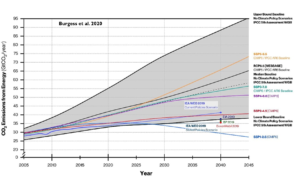DENVER–President Biden recently signed a sweeping executive order (EO) aimed at what the White House calls a “profound climate crisis.” As Biden’s unilateral exercise of authority notes, “There is little time left to avoid setting the world on a dangerous, potentially catastrophic, climate trajectory.”
U.S. Senator Michael Bennet agrees, chiming in that “Climate change is a major threat to our national security, our economy, our health, and our way of life,” while Colorado Congressman Ed Perlmutter notes that, “If we are going to build a better future and combat the climate crisis, we must listen to the experts.”
These actions and rhetoric are predicated on the perception that climate change is an imminent threat to humanity, a perception that may be based on what one expert, Professor Roger Pielke, Jr. of the University of Colorado Department of Environmental Studies, calls the “the unstoppable momentum of outdated science.”
In an article published November 30, 2020 in the Honest Broker Newsletter Pielke writes, “Much of climate research is focused on implausible scenarios of the future, but implementing a course correction will be difficult.”
“Ultimately, the issues associated with the misuse of scenarios in climate research and assessment are a matter of scientific integrity,” he concludes.
Pielke cannot be called a climate change denier. Indeed, he has long been an advocate for action, but he is also a vigorous advocate for accurate, dispassionate and politically neutral science as an essential predicate to discussions of climate change policy.
“Responding to climate change is critically important,” writes Pielke. “So too is upholding the integrity of the science which helps to inform those responses.”
As an example of outdated science keeping its momentum, Pielke writes of a 2015 literature review of some 900 peer-reviewed studies on breast cancer using a cell line “derived from a breast cancer patient in Texas in 1976.” But in 2007, he says, it was confirmed that it was a skin cancer line, not one related to breast cancer, and that even now it is being improperly used in breast cancer research.
Pielke writes, “In 2020, climate research finds itself in a similar situation to that of breast cancer research in 2007. Evidence indicates the scenarios of the future to 2100 that are at the focus of much of climate research have already diverged from the real world and thus offer a poor basis for projecting policy-relevant variables like economic growth and carbon dioxide emissions.”
Pielke published a graph showing how carbon dioxide emissions scenarios for the future, including the one “most commonly cited” by climate researchers, Representative Concentration Pathway 8.5 (RCP8.5), diverge significantly from actual emissions to date (dark purple curve).

“The misuse of scenarios in climate research and assessment documented in this paper includes the inappropriate identification of an extreme, implausible scenario [RCP8.5] as a reference or ‘business as usual’ baseline and the improper comparison of scenarios generated from different integrated assessment models.”
Pielke writes, ”Evidence is now undeniable that the basis for a significant amount of research has become untethered from the real world.”
He says his literature review shows “almost 17,000 peer-reviewed articles that use the now-outdated highest assessments of the IPCC and the U.S. National Climate Assessment.”
His drive for accurate, truthful science has not come without criticism or derision. Climate alarmists routinely disparage both Pielke and his father, Robert Pielke Sr., a climate scientist who is likewise a critic of shoddy science. The “cancel culture” is particularly strong when it comes to adhering to climate change orthodoxy.
Criticizing the International Panel on Climate Change (IPCC) for virtually always choosing the most hair-raising and drastic scenario upon which to base its recommendations, in an April, 2020 paper, Pielke wrote, “The consequences of RCP scenario misuse include a myopic perspective on alternative futures and a correspondingly limited view on policy alternatives, the creation of a vast academic literature with little to no connection to the real world, and an unwarranted emphasis on apocalyptic climate futures that influences public and policy maker perspectives and the climate policy discourse in broader society.”
In a 2017 lecture in London, England Pielke described current climate politics as “Manichean paranoia,” which describes a worldview “in which your opponent is considered to be malign and willfully ignorant, whereas your own side is noble and uniquely enlightened.”
Nor is he enamored of the role of the press in perpetuating “Manichean paranoia” about climate change.
“An analysis by the Dutch newspaper de Volkskrant in early 2020 found that 80% of its references in news stories to climate change projections to 2100 of the previous five years were ultimately based on studies relying on RCP8.5, with two-thirds of the news stories presenting RCP8.5 as a prediction of the future,” wrote Pielke.
RCP8.5 is the scenario of “business as usual” where no efforts to rein in carbon dioxide emissions are made, something Pielke says is made obsolete by the fact that emissions, particularly in the U.S., have been drastically reduced in the last 25 years or more.
In a 2019 Forbes column, Pielke referred to the widespread misuse of extreme climate scenarios as “climate porn.”
Because of the COVID-19 pandemic, Pielke says that carbon emissions dropped an additional 7% over the existing downward course of emissions.
“Rather than seeing coal use expand dramatically around the world, it has actually declined in many regions,” says Pielke. “It is even conceivable, if not likely, that in 2019 the world has passed ‘peak carbon dioxide emissions.’”

